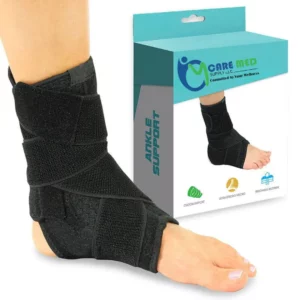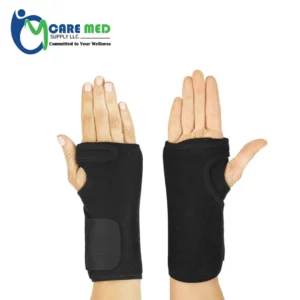Description
Heart health is a vital aspect of overall wellness, and regular monitoring can help detect potential issues early. The ECG Portable Heart Rate Monitor provides clinical-grade accuracy in a lightweight, easy-to-use format, empowering users to track their heart’s performance anytime, anywhere. This device is particularly beneficial for those with a history of arrhythmias, palpitations, or other cardiac concerns.
The ECG Portable Heart Rate Monitor typically features electrodes that capture the heart’s electrical signals. It displays the data on a built-in screen or transfers it to a connected app for detailed analysis. This device is compact, making it convenient for home use or travel, and many models are rechargeable, offering extended use.
Key elements include:
- ECG Recording: Captures a detailed waveform of the heart’s activity.
- Heart Rate Display: Shows the current heart rate in beats per minute (BPM).
- Data Sharing: Options to save and share reports with healthcare providers.
Key Features
- Portable Design
Compact and lightweight, perfect for on-the-go heart monitoring. - High Accuracy
Provides clinical-grade ECG readings for reliable results. - Bluetooth or USB Connectivity
Syncs with apps or computers for data storage and analysis. - Easy-to-Read Display
Shows heart rate and other vital information clearly. - Real-Time Monitoring
Offers instant results, helping users stay informed about their heart health. - Rechargeable Battery
Long-lasting power with USB charging for convenience. - Memory Functionality
Stores past recordings for tracking trends and progress. - Multiple Users
Some models allow multiple profiles, ideal for family use.
Advantages
- Convenience
Provides the ability to monitor heart health anytime, avoiding frequent clinic visits. - Preventive Health
Detects early signs of cardiac issues, enabling timely medical intervention. - Ease of Use
Intuitive controls and interfaces make it accessible to non-medical users. - Cost-Effective
Reduces healthcare expenses by minimizing the need for frequent ECG tests at hospitals. - Data Management
Offers options to track progress over time and share reports with healthcare providers seamlessly.
Who Can Benefit?
- Individuals with a history of heart conditions like arrhythmias or palpitations.
- Athletes and fitness enthusiasts monitoring heart performance.
- Elderly individuals or those at risk of cardiovascular issues.
- Healthcare professionals for portable diagnostics.
The ECG Portable Heart Rate Monitor is a powerful tool for maintaining cardiovascular health. Its portability, accuracy, and advanced features make it a valuable device for personal or professional use. Whether you’re managing a heart condition, tracking fitness goals, or ensuring preventive care, this device provides the insights needed to take control of your heart health.
By bridging the gap between traditional medical diagnostics and everyday convenience, the ECG Portable Heart Rate Monitor empowers users to stay proactive and informed, promoting a healthier lifestyle.
FAQs

1. What is an ECG Portable Heart Rate Monitor?
An ECG Portable Heart Rate Monitor is a compact device that measures the heart’s electrical activity (ECG) and displays your heart rate in real time. It provides clinical-grade accuracy in a portable format, suitable for personal or professional use.
2. How does it work?
The monitor uses electrodes to capture the electrical signals generated by your heart. These signals are processed to display the heart’s rhythm (ECG waveform) and calculate your heart rate in beats per minute (BPM).
3. Who should use an ECG Portable Heart Rate Monitor?
This device is ideal for:
- Individuals with heart conditions like arrhythmias or palpitations.
- Athletes monitoring their heart rate during exercise.
- Elderly individuals or those at risk of cardiovascular diseases.
- Healthcare providers for quick, portable diagnostics.
4. Is it accurate?
Yes, ECG Portable Heart Rate Monitors are designed to provide clinical-grade accuracy. However, for critical conditions, it’s best to consult a healthcare professional for further analysis.
5. Is it easy to use?
Absolutely! Most monitors are designed with user-friendly interfaces. They often come with clear instructions and require minimal effort to operate, even for non-medical users.
6. Can it detect heart problems?
While the monitor can detect irregularities in heart rhythm or rate, it is not a replacement for professional medical diagnostics. Consult a doctor if you notice any abnormal patterns.

7. How do I use it?
Using the monitor is simple:
- Turn on the device.
- Place it on your chest, finger, or palm, depending on the model.
- Wait a few seconds for the device to capture the reading.
- View the results on the screen or sync with an app for detailed analysis.
8. Can I share the results with my doctor?
Yes, most devices allow you to save and share data via Bluetooth or USB. Many models also integrate with health apps to email or export reports directly to healthcare providers.
9. Is it suitable for continuous monitoring?
Some models support continuous monitoring for extended periods, while others are designed for spot checks. Check the product specifications to ensure it meets your needs.
10. How is it powered?
The device is typically powered by rechargeable or replaceable batteries. Most models include a USB cable for recharging.
11. Is it waterproof?
Many monitors are water-resistant but not fully waterproof. Always check the manufacturer’s guidelines before exposing the device to water.
12. How long does the battery last?
Battery life varies by model, ranging from several hours of continuous use to weeks of intermittent monitoring. Rechargeable models often last longer between charges.
13. Can it be used for multiple users?
Yes, many monitors allow multiple user profiles, making them suitable for families or small healthcare practices.











Reviews
There are no reviews yet.